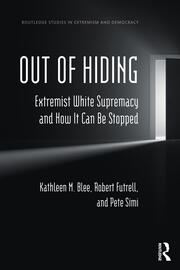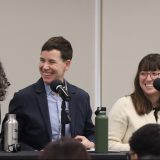
Out of Hiding: Extremist White Supremacy and How It Can Be Stopped Faculty Book
February 9, 2024
 Dr. Pete Simi (Sociology) is known for his expertise in political extremism and his research focuses on both violence and extremist groups in the United States and around the world. His previous book, American Swastika: Inside the White Power Movement’s Hidden Spaces of Hate, explores the difference between movements such as the Ku Klux Klan, Aryan Nations, and racist skinheads, detailing the long history of white supremacy movements in America. His latest publication, Out of Hiding: Extremist White Supremacy and How It Can Be Stopped (co-authored by Kathleen M. Blee and Robert Futrell) is an effort to explain the most recent resurgence of what they call extremist white supremacism.
Dr. Pete Simi (Sociology) is known for his expertise in political extremism and his research focuses on both violence and extremist groups in the United States and around the world. His previous book, American Swastika: Inside the White Power Movement’s Hidden Spaces of Hate, explores the difference between movements such as the Ku Klux Klan, Aryan Nations, and racist skinheads, detailing the long history of white supremacy movements in America. His latest publication, Out of Hiding: Extremist White Supremacy and How It Can Be Stopped (co-authored by Kathleen M. Blee and Robert Futrell) is an effort to explain the most recent resurgence of what they call extremist white supremacism.
“In 2017 when the deadly white supremacist rally in Charlottesville, Virginia happened a lot of people were caught off guard; four years later when thousands descended on the U.S. Capitol promoting Donald Trump’s stolen election conspiracy theory and a segment of those folks attacked our government, including hundreds of law enforcement officers, people remained surprised that this could happen in the U.S.,” said Dr. Simi.
In his book he uses both the Capitol attack and the Charlottesville rally as ‘moments’ to help readers understand where such extreme instances of violence originate and what they represent.
“We want readers to understand the extensive planning that went into both Charlottesville and the Capitol attack but also the longstanding culture of white supremacy deeply entrenched in U.S. society which almost guarantees violence like this will continue to happen.”
The Voice of Wilkinson sat down with Dr. Simi to talk about the new book.

Dr. Pete Simi
Voice of Wilkinson: Tell me why you decided to write this book?
Pete Simi: I know I speak for my two co-authors (and myself) when I say each of us has a deep commitment to trying to produce scholarship that can be helpful in some way, even if only in a small way. So, we definitely wrote this book in that spirit; a spirit of wanting to promote justice and part of promoting justice means understanding obstacles and resistance to justice. Our book is unfortunately very timely and U.S. society in many respects is on the brink. Principles of democracy are under fire and a segment of the population seems more comfortable with the allure of authoritarianism. The challenge has always been here since the founding of our republic and for that matter these tensions in one form or another have been playing out over the entire course of human history.
VoW: What do you think readers will be most surprised about?
PS: I hope readers will challenge themselves to think more about the fact that Americans aren’t as special or as unique as we like to think. Throughout our country’s history, we’ve practiced some of the same horrors we associate with other countries and if we don’t think things can get a lot worse in very short order then we are kidding ourselves. I think more than anything we wanted to offer a warning that a full throttled authoritarian takeover can happen here. But we also wanted to discuss a path forward which we do in our last chapter. Although talking about solutions must be done with sobriety and honesty so we try to do that by emphasizing that there are no easy fixes, and any path forward is going to be exceedingly difficult.
VoW: What did you learn while researching this book? Did anything surprise you?
PS: I think when you have the opportunity to write a book one of the most rewarding aspects of the process is how much you get to learn. I feel grateful for the time to ask these questions, cull through information, and try to craft some degree of reasonable explanations. I think I was most surprised by how many opportunities or what we refer to as windows of opportunity over time we just keep missing. For our focus, the years after the U.S. Civil War during the Reconstruction Era were such an enormous, missed opportunity. Had that period gone differently we would likely live in a very different country today and a far more just society than what we currently have. But there’s also been so many more recent missed opportunities. The 2008 election of Barack Obama could have and frankly should have been a wonderful unifying moment and I suppose for a very brief time it was and continued to be for some segment of society but it also helped produce a horrific backlash – – a second wave of the anti-government militia movement, a Tea Party movement that basked in racist memes like depicting Obama as a tribal war chief, and record numbers of death threats to the new president.
And, there were also many missed opportunities to acknowledge these growing threats and allocate greater resources to prevention and enforcement, but we chose instead to minimize, ignore, and deny while focusing our collective attention elsewhere.
VoW: You’ve mentioned how social media plays a role in all of this. Tell me about it.
PS: I think what most surprised me while writing this book was my need to reassess and come to terms with how much of a role social media and digital technology more broadly are playing in terms of the circulation, normalization, and mainstreaming of these age-old problems. To be clear, social media is certainly not creating the problems but has added a whole new dimension to exacerbating these old problems. Quite simply, the technology is terrifying in terms of its implications for generating and spreading propaganda. There’s a power here we’ve unleashed especially on our children that is really shocking and we are so far behind in terms of regulation and addressing critical health and safety concerns.
While the things I mentioned above are very frightening and disheartening, I remain convinced that we can do better; that a radical public health approach could be designed and implemented that would go a long way to protecting the principles of democracy and the health and safety of individuals across the country.

